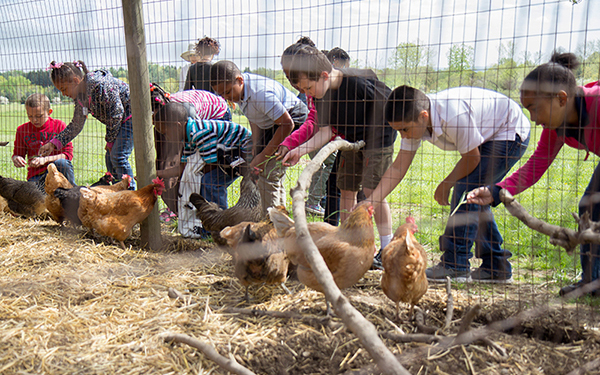Kids dig into farm-fresh food with Millennium grant

"Where do eggs come from?"
For many kids, especially those who live in the city, the answer is simply "the grocery store." In fact, many of them have never seen a chicken in person or even visited a real farm.
But all of that is changing with the help of a Millennium Fund grant that is providing scholarships to the Summer Farm & Science Camp at Crown Point Ecology Center in Bath.
The weeklong camp, which began more than a decade ago, offers area children a unique, hands-on learning experience on a 115-acre farm and nature preserve. While there, children dig their hands into the organic farm, collect eggs from the chicken coop, take a peek inside a beehive, and much more.
"Children are encouraged to touch and explore," said Nancy Wolf, executive director of Crown Point. "As we become more and more removed from where our food comes from, our camp offers a wonderful opportunity for children to work in a garden and harvest fresh produce."
Kids at the camp also become young scientists as they explore the pond and wetland and collect tiny creatures with nets. After observing their catches with microscopes and recording the findings in a journal, the children release the creatures back into the water, teaching them to respect and care for living things.
In addition, while immersed in nature, kids get a much-needed break from electronic devices and have the opportunity for quiet reflection – something that is becoming rare in today's society, Wolf said.
"Many children today do not have easy access to green space and spend increasingly more time (in front of) a screen," she said. "Our camp offers an antidote to these trends."
This is especially true for kids from the city, who may have never dug potatoes out of the dirt or experienced the serenity of the woods before. That's why the agency is committed to offering scholarships to kids who otherwise would not be able to attend camp through grants from the Millennium Fund.
And although children who attend the camp experience an immediate increase in their quality of life, the long-term effects of the camp are truly priceless, Wolf said. Not only do kids learn about the importance of eating fresh, healthy foods, but they also take that knowledge home to their families.
"By gaining more knowledge of where food comes from and experiencing eating whole foods, they will have the knowledge to make better eating choices now and in the future," Wolf said. "Our hope is that it encourages them to include outdoor activities and green space in their lives, which leads to healthier people, communities, and overall a healthier planet."
Campers also learn lifelong skills about money and entrepreneurship by participating in a farmers market at the end of the week. On Friday, the kids work in teams to harvest vegetables and flowers to "sell" at their booth. They name their business and determine prices for each of their items. Then, as parents arrive to pick them up, the adults can purchase the food with play money and take it home for dinner.
"It's a wonderful learning experience on many levels," Wolf said. "There is the economics of pricing and selling their goods, and it takes organizational and collaborative skills to work with your team to set up your booth. There is a great sense of pride among the campers as they show their families what they've done during the week."
And while kids only spend a week at the camp, the dividends are reaped for years to come.
"These lasting experiences and knowledge will affect who they become as adults," Wolf said. "There is no better way to help children become more food literate and to bring an awareness about the earth."
